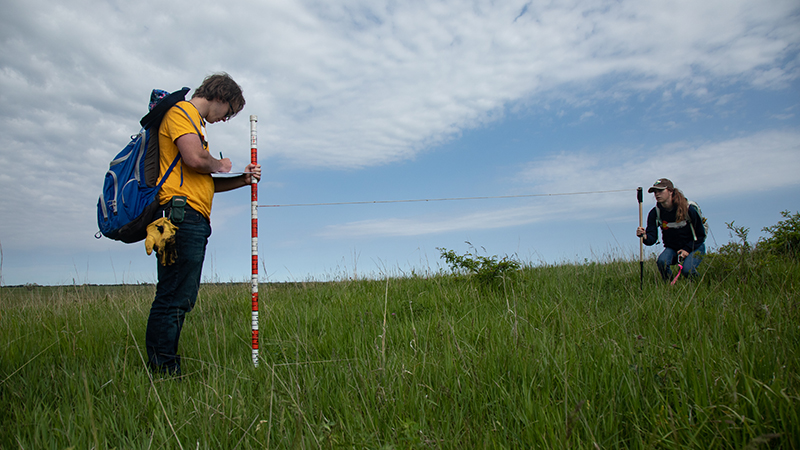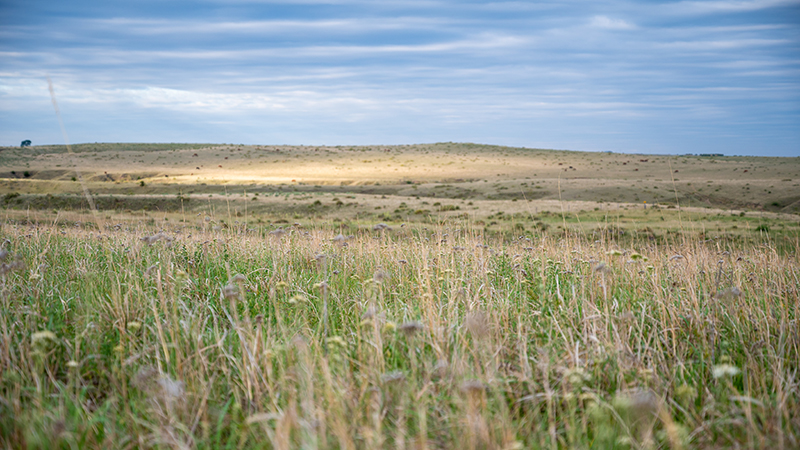

Wildlife Habitat Management Certificate
Prepare for a career in wildlife habitat management!
Effective management of wildlife habitat requires a background in animal and plant ecology, wildlife management principles, and management strategies for a complex range of habitat types such as grasslands, forests, aquatic watersheds, and land used for agriculture production. This interdisciplinary certificate leverages the strengths of the College of Agriculture Sciences and Natural Resources. The Wildlife Habitat Management Certificate program is open to degree‐seeking students at other two‐ and four‐year institutions, University of Nebraska–Lincoln undergraduates, and non-degree seeking students.
Admission to the certificate program for non-degree seeking students and current degree-seeking University of Nebraska–Lincoln students in colleges other than CASNR will required: (1) at least 8 credits of introductory biology (e.g., equivalents of LIFE 120 and 121) and (2) either two semesters of chemistry or one semester of physics. Transfer courses must meet the University of Nebraska–Lincoln CASNR transfer guidelines to be accepted.
Current students wishing to add this certificate to their Nebraska undergraduate degree program should contact one of the certificate advisors and complete the application form. Upon verification of completion of the prerequisite requirements with the appropriate grade, the department will admit them into the certificate program.
For students not enrolled at the University of Nebraska-Lincoln, the admission procedure is:
- Complete the visiting student application (select "Visiting" as your type of application).
- Pay the application fee.
- Provide proof of high school graduation or equivalent (G.E.D.) and the biology and chemistry/physics credit.
What will you learn?
Students who complete the Wildlife Habitat Management Certificate will be able to:
- Apply ecological principles to management of wildlife habitat in systems of grasslands, forests, aquatic watersheds, and agricultural production landscapes.
- Compare and utilize methods for identifying typical plant species in Nebraska and the Great Plains.
- Propose strategies for effective management of wildlife habitats.

Who could you work for?
Potential employers include non-governmental organizations (NGOs) such as Pheasants Forever and Ducks Unlimited, state wildlife agencies, and federal wildlife and natural resources agencies such as US Fish and Wildlife Service, US Geological Survey, the National Park Service, and other Department of Interior agencies. Wildlife biologists are in demand and each employer has specific requirements for their applicants. This certificate will enhance marketability of those who complete it.



Course descriptions for 18-credit Certificate
Required Courses (Credit Hours)
NRES 311 - Wildlife Ecology and Management (3)
Select one grassland management course (3):
- NRES 245 / PLAS 245 - Introduction to Grassland Ecology and Management
- NRES 438 - Grassland Conservation: Planning and Management
Select one forest management course (3):
- NRES 310 - Introduction to Forest Management
- NRES 457 / PLAS 457 - Green Space and Urban Forestry Management
Select one plant identification course (3):
- PLAS 442 / GRAS 442 / NRES 442 / RNGE 442 - Wildland Plants
- NRES 201 / LARC 201 / PLAS 201 - Dendrology: Study and Identification of Trees and Shrubs
Select one aquatic management course (3):
- NRES 468 / BIOS 458 / BSEN 468 / WATS 468 - Wetlands
- NRES 481/ WATS 481/ BIOS 481 - Stream and River Ecology
- NRES 459 / WATS 459 / BIOS 459 - Limnology
- NRES 470 - Lake and Reservoir Restoration
- WATS 354 / MSYM 354 / SOIL 354 - Soil Conservation and Watershed Management
Select one agriculture systems management course (3):
- PLAS 435 / NRES 435 - Agroecology
- RNGE 340 / PLAS 340 / GRAS 340 - Range Management and Improvement
- NRES 417 / PLAS 418 - Agroforestry Systems in Sustainable Agriculture
- NRES 438 - Grassland Conservation: Planning and Management
*Note: some of the above courses are 4 credit hours because of experiential laboratories, but a 3-credit course is available in each group
Meet your Advisor

Kenneth Pyle
- Address
-
School of Natural Resources
102a South Hardin Hall
3310 Holdredge Street
Lincoln, NE 68583-0981 US - Phone
- 402-472-7471
- kpyle4@unl.edu
- SSH Link
- Kenneth’s SSH Link

Sara Winn
- Address
-
School of Natural Resources
912 South Hardin Hall
3310 Holdredge Street
Lincoln, NE 68583-0989 US - Phone
- 402-472-0636
- sara.winn@unl.edu
- SSH Link
- Sara’s SSH Link